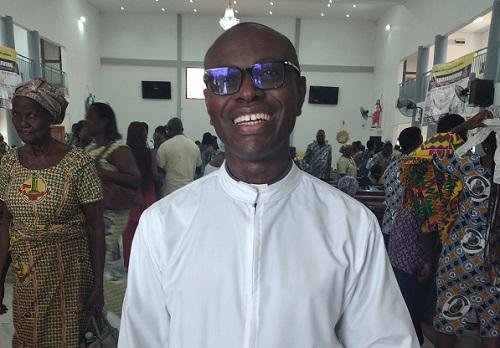Fruitful Living
New Catholic Dean for Madina Deanery

Very Rev Fr Bernard Kyei
The Metropolitan Archbishop of Accra, Most Rev John Bonaventure Kwofie has appointed Very Rev Fr Bernard Kyei as the new Dean for the Madina Deanary.
Very Rev Bernard Kyei who is the Priest-in-charge of St John of God Catholic Church, Amrahia, on the Adentan -Dodowa highway, takes over from Very Rev Fr Nimorius Kwabena Adomanzing.
The appointment which will last for five years, makes him an ex-oficio member of the Diocesan Council of Priests.
Preaching the homily last Sunday to mark the feast day of the church, Fr Bernard Kyei called on Christians to take advantage of God’s unlimited mercy and forgiveness to be cleansed of their inequities.
He said Christians ought to rejoice because Jesus the son of God had nailed their sins on the cross and won for them salvation.
He said lent should serve an ideal opportune time for all to amend their lives, forgive the wrongs of others in order that God would forgive them their sins.
He advised them not to condemn anybody, even prostitutes, because God the merciful judge would pardon all manner of sins, provided one returned to God with a contrite heart.
Very Rev Fr Kyei said God the arbiter of our lives was constantly calling us to come to the knowledge of the truth and be saved.
He asked them to imitate Jesus in all aspects of their lives, eschew sin because so long as they sinned, they crucified Jesus daily on the cross.
By Raymond Kyekye
Fruitful Living
Qur’anic Evidence on Environmental Responsibility (Part 2)
Allah draws our attention to the divine wisdom in creating the earth and subjugating its resources for human benefit:
“It is He Who created for you all that is on the earth.” (Surah Al-Baqarah, 2:29).
“And He has subjected to you, as from Him, all that is in the heavens and on earth. Behold, in that are signs indeed for those who reflect.” (Surah Al-Jathiyah, 45:13).
These verses affirm that the natural world is a divine gift created for human benefit, but not for reckless exploitation.
The trust (Amaanah) placed upon mankind requires careful and sustainable use, respecting the rights of future generations and all other creatures.
Islam and the Sustainable Development Goals (SDGs)
SDG 6 – Clean Water
and Sanitation
Clean water and hygiene are essential for life and spiritual purity. Islam obliges ablution (wudu) and cleanliness as part of daily worship.
The preservation of life (Hifz al- Nafs) is one of the five objectives of Shariah, and access to clean water and sanitation plays a key role in achieving it.
SDG 13 – Climate Action
Islam calls for moderation in consumption and energy use. Wastefulness (Israf) is condemned:
“Indeed, the wasteful are brothers of the devils, and the devil is ever ungrateful to his Lord.”
(Surah Al-Isra, 17:27).
Climate change, driven by overuse of fossil fuels and deforestation, threatens life on earth.
Muslims are taught to protect air quality, plant trees, and reduce carbon emissions—principles that resonate with SDG 13.
SDG 14 – Life below water
Oceans and marine ecosystems are under threat from pollution and overfishing. The Prophet warned against contaminating water:
“Do not urinate in stagnant water which people use.” (Sahih Muslim, Hadith 282).
This Hadith underscores early Islamic environmental regulations aimed at preserving clean water and marine life.
SDG 15 – Life on Land
Islamic teachings are rich in directives for land preservation. Allah warns: “And the earth we have spread out, and placed therein firm mountains and caused to grow therein all kinds of things in due proportion.” (Surah Al-Hijr, 15:19).
Tree felling without cause, soil erosion, and habitat destruction are all contrary to Islamic ethics.
By Imam Alhaji Saeed Abdulai, the Author
Fruitful Living
Why Should I forgive others? (Final)
Forgiveness is thenhigher way
Paul acknowledges the gravity of Onesimus’ offense. Legally and ethically, Onesimus had done wrong. Under Roman law, Philemon had every right to punish him. Yet Paul calls him to choose a higher path—grace.
“For this perhaps is why he was parted from you for a while, that you might have him back forever” (v. 15). Paul reframes the pain of separation as a providential opportunity for lasting unity.
As Christians, we’re invited to see beyond the offense and choose the eternal perspective. Forgiveness isn’t minimising the pain—it’s maximising the grace of God. It’s choosing to imitate Christ, who bore our sin without bitterness.
We are a forgiven people
Years in ministry often reveal a painful pattern: unresolved conflict and an unwillingness to forgive can cripple individuals and entire communities. Families drift. Churches divide. And the gospel is obscured by pride and pain.
Someone said something. Someone got offended. Someone refused to forgive. And so, healing never happened. Every time forgiveness is withheld, the Body of Christ suffers. But when we take steps to reconcile, we bear witness to the redemptive power of the gospel.
Forgiveness is more than an emotional release—it is a spiritual act of obedience. It puts God’s grace on display. It makes visible the invisible love of Christ.
Are you struggling
to forgive ?
Here are five helpful questions to evaluate your heart:
1. Do I feel anger or anxiety when I think about this person?
2. Do I secretly wish for them to suffer as I did?
3. Would I serve or help them if they needed it?
4. Can I sincerely pray for their well-being?
5. Would I be upset if God blessed them?
These questions don’t condemn us—they guide us. They help us identify areas where grace is still needed, where healing is still possible.
CONCLUSION
Forgiveness is one of the most Christlike things we can do. It doesn’t ignore justice—it entrusts it to God. It doesn’t excuse the offense—it acknowledges the cost and chooses love anyway.
Is there a Philemon in your life? Someone you need to forgive? Or are you more like Onesimus—longing to return but unsure if you’ll be received?
Today is a good day to choose grace. For the sake of the gospel, the Church, and your own soul, why not begin the process of forgiveness?
Let’s make this commitment together: By the grace of Christ, I will pursue unity, forgive freely, and live in the freedom that only forgiveness brings.
- By Rev. Dr Joyce Aryee, the author






